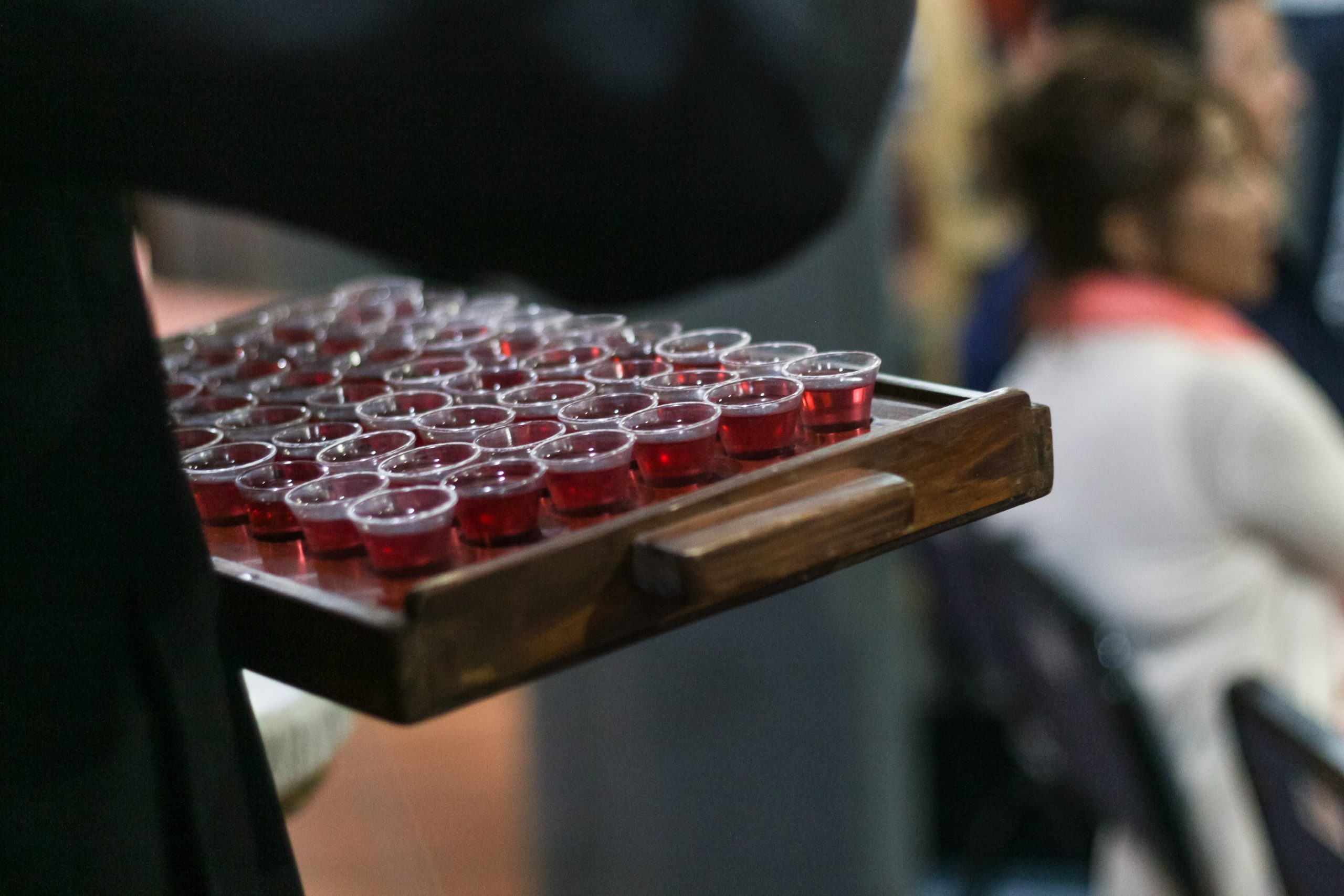For the past five months we have gone without sharing the Lord’s Supper – the special meal instituted by Jesus at the last supper and one of the central acts of the church’s worship for 2000 years. So it is with delight that I invite you to join us for Holy Communion this Sunday morning.
At first this was necessary as church buildings were closed and all Christian gatherings moved online. For the past few weeks it has been possible to share communion, but we held off until we could be confident that as many people as possible would be able to join us.
We have now been holding in-person services for a month and so are confident that we are able to hold a public act of worship in a way that keeps everyone safe, whilst doing our best to make church feel as normal as possible.
What precautions are being taken?
We have followed guidance from both the UK government and the national Church of England to ensure that those who come to church will be safe. You can download a copy of our risk assessment here.
To help give people confidence to return to church, Tom has recorded a short video to explain our precautions.
We have done these things so that you can be confident in coming to church knowing that by following the restrictions and regulations we have put in place, everyone will be kept safe.
Simply put, please follow the following guidelines:
- Book a ticket – this ensures that we can fit everyone in with appropriate space between groups.
- Do not come if you have any symptoms or have been told to self-isolate.
- Wear a face-covering and do not sing. (We suggest mouthing the words of songs as an appropriate way of participating in worship.)
- Use hand sanitiser: on arrival, departure and after any accidental contact with others.
- Maintain 2 metres distance wherever possible. (The use of face masks minimises any risk if you are closer at any point.)
- Enter church, sit in the marked seating and leave at the end – there will be an opportunity to socialise outside with appropriate social distancing.
How are we doing communion?
The Church of England have provided detailed advice about the distribution of Holy Communion which we will be following, with one exception.
You can read the full advice here.
In summary:
- We will not make physical contact or move around during the Sharing of the Peace.
- The Rector (Charlie) presiding at the Communion Table and any others helping to distribute will wash their hands before and after any involvement.
- The minister will not wear a face-covering whilst speaking from the front and presiding at the table, but the elements will remain covered until they are distributed.
- During the distribution of bread and wine everyone will wear face-coverings (unless there are communicants with a valid exemption).
- We will use individual wafers for communion, which will be brought around by the ministers and placed into the hands of the congregation. This involves coming within 2 metres, which the advice allows as everyone is wearing face coverings.
- (This is where we diverge from the national Church of England advice.) We will use individual cups for the wine, which will be brought around on trays for the congregation to take.
Why are we diverging from the Church of England advice?
I (Charlie) have not taken this decision lightly, but firmly believe that the current advice from the national church regarding the distribution of wine is both unscriptural and uncanonical.
We are not disobeying public health rules or disregarding any safety advice. Giving out communion wine in individual cups poses no public health risk – if individual pieces of bread can be distributed, then so can individual cups of wine.
This is a matter of theology and Christian practice and so we should be instructed by what God has said in the Bible and guided in our interpretation by Christians throughout the ages. In writing this, I have realised that it would take many more words to explore these issues, and so I will share some helpful links at the end.
In a recent online meeting of General Synod, the question was asked and answered:
Q68 Will the House of Bishops reconsider the prohibition of use of small individual cups as a valid ‘common sense’ pro tem way of sharing the Communion wine while current constraints remain?
The Bishop of London to reply on behalf of the Chair of the House of Bishops:
The Legal Advisory Commission has stated “it is contrary to law for individual cups to be used for each communicant” and that “the doctrine of necessity cannot be appealed to in order to justify the use of individual cups even in circumstances where there is a fear of contagion from the use of a common cup. …the Sacrament Act 1547 makes provision for cases where a necessity not to deliver a common cup arises: in such a case the normal requirement that the sacrament be delivered in both kinds is disapplied by statute. Even if a shared cup cannot be used for medical reasons, the use of individual cups remains contrary to law….In such cases reception should be in one kind only.” The House cannot authorise or encourage a practice which would be contrary to law.
July 2020, online Synod
This position is now being challenged on legal grounds, as is explained by a recent Church Times article. This might seem to be very intricate naval-gazing at a time of national crisis, but it is a significant question for the future of the church. For some of us it has become a choice between obeying God or obeying human authorities.
Thus, the current Church of England advice is that we all share the bread – ideally in individual portions/wafers, but that only the priest drinks the wine. I believe that this is wrong and it is my duty as a faithful minister to distribute both bread and wine.
It is a matter of Unity
It has been difficult for some people to understand why we have waited until now to celebrate Holy Communion. It is because I believe that it is around this table, as we look to the sacrifice of Jesus on the Cross, that we find and express our unity. The Lord’s Supper is a sacrament – a sign and means of God’s grace to His people.
Sharing this common meal is an expression of our identity as the people of God. Everyone who trusts in the Lord Jesus is welcome to come to Him. In the same way that baptism is available to all who come to put their trust in the God who is Father, Son and Holy Spirit, so no one who confesses that faith and is living it out should be excluded from the table and from the bread and wine that is shared.
The question of whether or not everyone in the congregation should share the wine is not new. Our country even has laws about it. The Church of England is governed by the 39 Articles and one of them specifically addresses this question:
THE Cup of the Lord is not to be denied to the Lay-people: for both the parts of the Lord’s Sacrament, by Christ’s ordinance and commandment, ought to be ministered to all Christian men alike.
Article 30 of the 39 Articles.
Thus it is Anglican to insist that, wherever possible, the whole congregation is be included in the distribution of both bread and wine.
More than that, I believe that it is a faithful reflection that we all come before God on the basis of His grace, not on any power or merit within us. A ceremony that allows the minister to have wine, but denies it to everyone else, suggests that some of us have better access to God than others. Ordination does not get you closer to God.
It is a matter of Obedience
Covid-19 has limited our lives in many ways, but we still have to work out how to obey God’s commands to us. There was a time that we couldn’t gather, so we found others ways to ‘spur one another on to love and good deeds’. We can’t physically greet one another, but there are different ways to ‘greet one another with a holy kiss’.
At the last supper, when Jesus instituted this sacrament to his disciples, he took the bread and the cup and shared it. In Matthew 26, we read:
While they were eating, Jesus took bread, and when he had given thanks, he broke it and gave it to his disciples, saying, “Take and eat; this is my body.”
Then he took a cup, and when he had given thanks, he gave it to them, saying, “Drink from it, all of you. This is my blood of the covenant, which is poured out for many for the forgiveness of sins.
We are now following this example. In fact, the Church of England recognises Jesus’ command to follow His example:
ALMIGHTY God, our heavenly Father, who of thy tender mercy didst give thine only Son Jesus Christ to suffer death upon the Cross for our redemption; who made there (by his one oblation of himself once offered) a full, perfect, and sufficient sacrifice, oblation, and satisfaction, for the sins of the whole world; and did institute, and in his holy Gospel command us to continue, a perpetual memory of that his precious death, until his coming again:
The Book of Common Prayer
COVID-19 might require us to be flexible in how we remain faithful, but it doesn’t mean that we don’t have to obey Him. So, what is more obedient: that only one of us takes the cup or that we all take wine in many cups?
This shouldn’t be a big deal. It is already normal custom in churches and cathedrals to have multiple cups for practical reasons and, of course, other Christian groups regularly use individual cups. So in a time of pandemic and fear of infection, I believe the most united and obedient thing to do is have individual cups.
Conclusion
Whilst I have tried to give a summary of my position here, it is far from everything I could say. I do not disobey the legal advice of the House of Bishops lightly, and I am not trying to make things difficult for anyone. But I felt it was important to explain why we are doing what we are in Lutterworth, Cotesbach and Bitteswell.
However, I do not want anyone to feel under pressure to join me in rejecting this advice and so will leave it to people’s consciences on Sunday. But I will be offering both bread and wine to the whole congregation in our services here.



